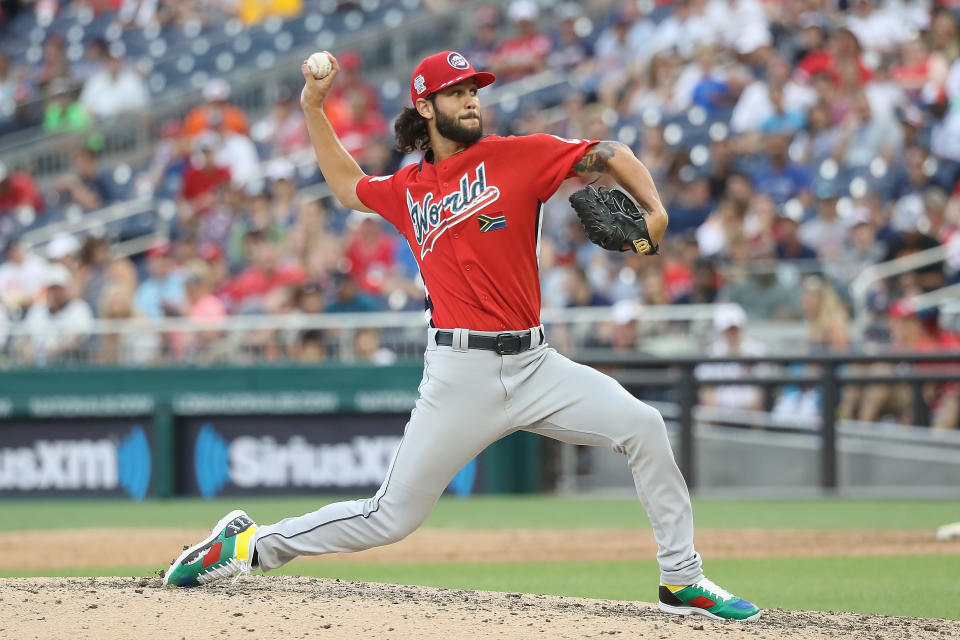Minor-league pay leads to some minor leaguers working odd jobs
WASHINGTON, D.C. – When the road to the big leagues is long and unfamiliar, when the curves are unmarked and speed traps discreet, it might be best to just Uber. Particularly in Phoenix. Maybe in a Volkswagen GTI. Live a little.
“I prefer the happy hour crowd,” Kieran Lovegrove said of his work behind the wheel. “Four to seven. No late nights or big events.”
Lovegrove, 23, is a right-handed pitcher for the Akron RubberDucks, Double-A for the Cleveland Indians, where his ERA over 16 appearances is 1.19. He also drives for Uber in Phoenix. And some for Lyft. He’s unloaded trucks for a Best Buy in Mission Viejo, California, distinguishing himself so quickly, as he recalled it, he was offered a management position after a week. He’s logged hours in a UPS warehouse as recently as last winter.
Sure, minor-league baseball is a job.
“It’s still minor-league pay,” Lovegrove said.
The side gig covers the rent in the off months. Maybe it’s gas money. Or beer money. Or date money. It might get you that talking bass thing you’ve always wanted. The average monthly salary in Double-A is about $3,000. The season runs five months. So, which of the jobs is the true side gig?
“It’s taught me I never want to have a normal job,” Lovegrove said with a laugh. “It’s tough out there.”
The commissioner himself has designated the minor-league life as an apprenticeship, or something less than a vocation. If it’s supposed to be a career, well, you’ll know who you are. The rest cherish the postgame spread. It’s free. Lovegrove’s trainee years are into their seventh summer. He is, therefore, becoming very skilled, as evidenced by his presence here, at the annual Futures Game.

They call it a “real job” until the money comes for the summer job, or at least until the money becomes inevitable. The real job looks like work. It feels like work. Worse, sometimes, it pays like work. When Jesus Luzardo, the Double-A pitcher for the Oakland A’s, received his first real job paycheck — “About a hundred dollars,” he said — it felt earned. Not that the baseball money didn’t. He’d practically killed himself for that. It was just … different. Luzardo hadn’t really considered an offseason job, but, he said, “My dad actually never made me, but he hinted at it.”
So, for two off-seasons in Parkland, Florida, he signed up with Delivery Dudes, running meatloaf and orange chicken and mushroom pizza around town in his Chevy Silverado. He worked nights, some days, and the work paid for his weekly round of golf. Last winter he graduated to the switchboard.
“I think it makes you value work,” he said. “Maybe it helps in maturing too. If I work 10 hours a week, with all my baseball stuff, it’s hard-earned money.”
Keston Hiura, Double-A second baseman for the Milwaukee Brewers, looked almost wistful.
“I’ve actually always wanted a job,” he said.
He gestured across the luxurious home dugout at Nationals Park, at teammates he’d met and hadn’t, to a locker of cleaned and pressed uniforms and shiny shoes.
“This is my first job,” he said.
Hiura is 21 years old. He has dedicated himself to the game, which has demanded year-round commitment. Hard work. Millions of reps. Followed by the reward.
“Oh, I live off my parents,” he said.
Buddy Reed, the Bronx-born, Rhode Island-raised, Florida-schooled outfielder for the San Diego Padres, shook his head slowly. No job, he said. Not ever. His parents never brought it up.
“Only child,” he said. “They wanted me in the house.”
A summary canvas of two clubhouses, of the young men in them, found about half had held some sort of job outside baseball. Many had not. Some were horrified at the thought. A few seemed to consider the question, consider the age of the interrogator, and wonder who let the judgy old guy in.
“Hey,” Shaun Anderson, a Double-A pitcher for the San Francisco Giants, said in defense of the questions, “can’t just sit home and do nothing.”
Like every head in the room turned to learn who the go-getter was.
So he took an off-season job bartending at a golf course in Florida. The money wasn’t great, not like that job he had making parts for motorcycles a couple years back, but the perks.
“Just so I could play golf for free,” he said.
The fact is, of course, what they do is work. The days are long. The hourly wages are pathetic. The likelihood of failure, washing out, one day soon having to find one of those real jobs forever, is real enough.
It was that very notion that led Kieran Lovegrove to walk into that Best Buy, Store 101, and apply for his first job. He’d be a holiday temp, the 3 a.m. to noon shift, moving pallets loaded with goods, breaking them down, “Trying not to get crushed by ‘em.” Then he’d go to the gym. Then he’d go back to bed. He did it for three months.
“I needed to know what it was like to work a real job,” he said.
It comes for everyone eventually. Or close enough to everyone. Because the road is long. And it can be exhausting.
So if you’re in Phoenix, call Kieran. He’ll get you there.
More from Yahoo Sports:
• France storms to second World Cup title in victory over Croatia
• Pussy Riot claims responsibility after fans invade World Cup pitch
• Cardinals fire manager Mike Matheny amid multiple controversies
• Manny Pacquiao shows vintage signs of dominance over Lucas Matthysse


